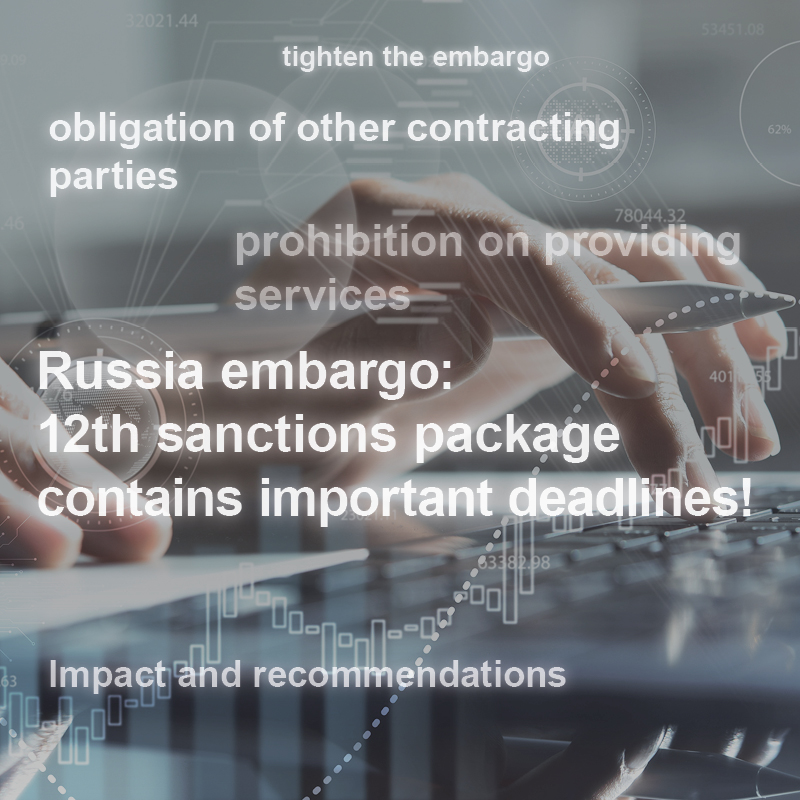18.01.2024
Russia embargo: 12th sanctions package contains important deadlines!

Part 1: Obligation to be imposed on foreign contracting parties from 20 March 2024
On 18 December 2023, the EU published its 12th package of sanctions, comprising Regulations (EU) 2023/2873, 2023/2875 and 2023/2878, to tighten the embargo against Russia. Amongst other things, the package includes new provisions that apply to all companies selling certain goods to third countries outside the EU.
Regulation (EU) 2023/2878 inserted a new Article 12g into the applicable Russia embargo Regulation (EU) No. 833/2014, under which all (European) companies selling, supplying, transferring or exporting specific goods or technology to a third country outside the EU are obliged, from 20 March 2024, to “contractually prohibit” re-exportation by the respective other contracting party to Russia or (via intermediaries) for use in Russia. The contractual agreement must also contain “adequate remedies” in the event of a breach. Furthermore, any such breach by the respective other contracting party must be reported to the competent authority; failure to do so will be subject to a fine.
The obligation concerns the goods and technology listed in the already known Annexes XI, XX and XXXV to Regulation (EU) No. 833/2014, as well as firearms and ammunition as listed in Annex I to Regulation (EU) No. 258/2012 and “common high priority items”, as listed in the new Annex XL, which – rather than merely including particularly sensitive military items or key technology – affect a large number of suppliers and industries.
Sales to the “partner countries” listed in Annex VIII to Regulation (EU) No. 833/2014 (currently, USA, UK, Japan, South Korea, Australia, Canada, New Zealand, Norway, and Switzerland) are exempt from the obligation to contractually prohibit re-exportation to Russia. In addition, contracts that were entered into before 19 December 2023 may continue to be performed unchanged until 20 December 2024 or until their expiry date, whichever is earlier.
It is unclear what the required contractual agreement should look like, and what remedies can be considered “adequate” (possible remedies include contractual penalties, rights to rescind/terminate contracts not yet fully performed, and internal blacklisting). It remains to be seen whether the European Commission will provide further information in its FAQs.
The EU appears to assume that each delivery to a third country of goods concerned is based on an individually negotiated contract that could easily be amended on a case-by-case basis to include an adequate prohibition clause. The same applies to existing framework agreements, which could be supplemented with an adequate clause by means of an addendum. This fails to take into account that, in practice, contracts are frequently entered into electronically using automated processes, without negotiating individually, and that an order may comprise both non-critical goods and goods concerned, making it difficult to differentiate between these two types of goods (this item may be re-exported, that item may not be re-exported). Furthermore, a distinction would also have to be made based on the country of destination: While a customer in the USA could be supplied without restriction, a customer in China would have to agree to a prohibition clause, which would be difficult to implement contractually in practice.
In any case, there should be no doubt that the contractual prohibition can (of course) also be contained in general terms and conditions, provided it is ensured that the general terms and conditions are validly incorporated into the respective contractual relationship. This frequently causes problems and inconsistencies, in particular in cross-border business relations.
Exporting EU companies should, therefore, be prepared to adjust or, as the case may be, already have adjusted their contractual relationships with foreign customers outside the EU in an appropriate manner since 20 March 2024.
Part 2 of our blog post on the 12th package of sanctions, which will be about the amendments to Article 5n of Regulation (EU) No. 833/2014 (prohibition on providing services from 21 June 2024, also in relation to Russian subsidiaries), will shortly follow.

Ole-Jochen Melchior
Partner
Essen
ole.melchior@luther-lawfirm.com
+49 201 9220 24028